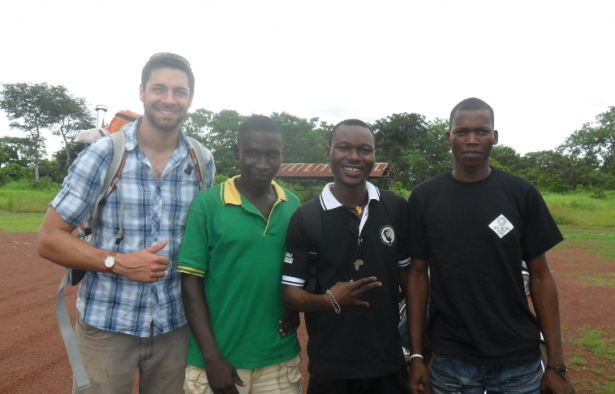
Sebastien, far left.
What’s the community where you live and work in Obo, CAR, like?
Obo is a very remote place in Africa. It is extremely hard to reach – that’s why we rely heavily on air transportation. There are some NGOs but no expats, which is a great opportunity to get close with locals, but at the same time very demanding intra-culturally. The Zande community in Obo is very genuine. It’s incredible to see how they keep going despite ongoing armed violence and harsh economic conditions.
Tell us a bit about the team – who do you work with and what are they like?
The Invisible Children CAR team is composed of Central Africans, which is a great experience. Sometimes there are cultural differences, but it makes every working day an exciting one! They are very determined in what they do because many of them are direct victims of the LRA. It’s great to be able to support them because you know that the development of the country will be through them. Also their local knowledge is an unbelievable asset to rely on and, most importantly, learn from.
Who’s the funniest in the office?
Me, obviously. On a more serious note – the office is very joyful because there’s strong bonds with one another.
What’s the most challenging aspect of living and working in CAR?
Living conditions are spartan. The cultural aspect is important because you will work with many different people coming from different countries. The south-east of Central African Republic [where the Invisible Children office is located] is highly diverse. The work culture is extremely different, and logistics are very complicated – so patience is key.
What’s the best thing about working in the IC CAR office?
If you are looking for an entry-level position that is highly demanding but from which you can learn tremendously, then this is the job for you. I guess that I learned more than I gave to people, and this will prove to be life-changing for sure. I think it’s important to underline [that it will be tough] because this position will exhaust you and you have to be ready.
This job is very hands-on. You’ll see the result of your hard work and will lead innovative projects that are unique to Invisible Children. You’ll also develop relationships that you don’t find in any other humanitarian position.
The Project Officer has to be able to take on many different responsibilities. I’ve been doing construction work, accounting, training, driving, logistics, communication work, gardening, human resources and managing projects – so it’s highly diverse.
What kind of qualities do you think someone needs to thrive in the Project Coordinator role?
Patience, curiosity, kindness, cultural sensitivity, a high sense of integrity, adventurous, innovative, self-sufficient, resistant to stress, diplomatic, a hard-worker.
Anything else you would say to someone considering applying for this role?
Good luck!
Thanks Sebastien!
Think people should hear about this?